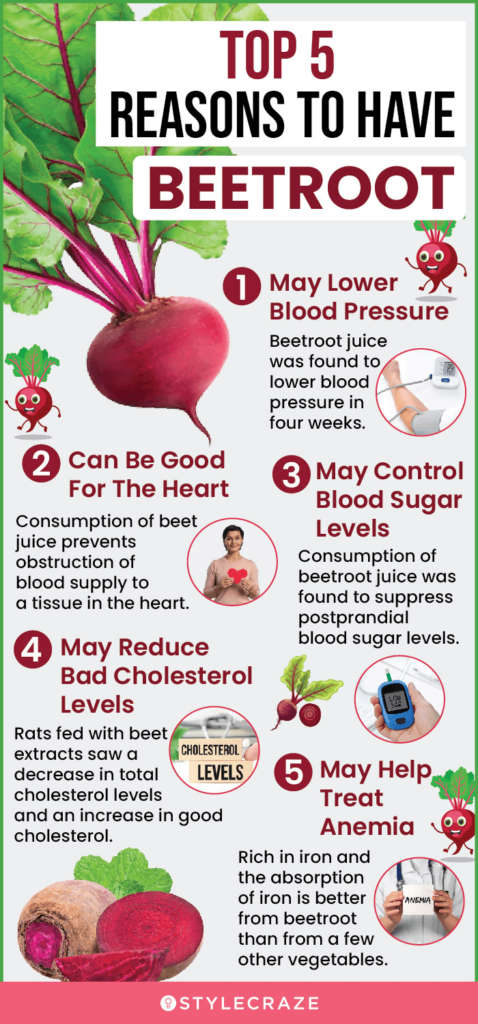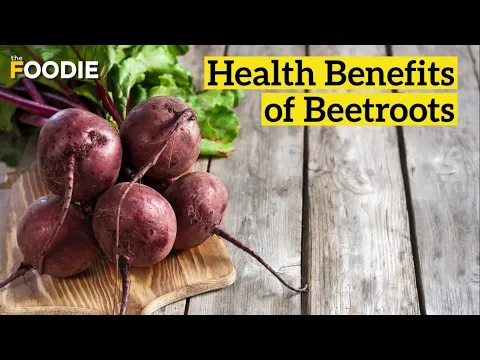Beets are rising in popularity as a nutritious addition to a balanced diet. With their deep red hue and sweet, earthy flavor, beets not only liven up a salad or side dish but also provide a substantial dose of antioxidants and important vitamins and minerals.
What are the Benefits of Eating Beets?
Beets have long been considered a superfood due to their dense nutritional profile. Here are some of the top health benefits of beets:

Beets Are Nutrient-Rich
One of the standout qualities of beets is that they contain a wide array of vitamins, minerals, and antioxidants. Some of the top nutrients found in beets include:
- Folate: Beets are a leading source of folate, providing 33% of your daily value per 1/2 cup serving. Folate is a B vitamin that is vital for cell growth and replication. It can help prevent neural tube birth defects when consumed pre-conception and during early pregnancy.
- Manganese: Beets have excellent levels of manganese, a mineral that plays a role in bone health, wound healing, blood clotting, and more.
- Copper: Beets contain good amounts of copper, a mineral needed for immune function, iron absorption, and production of red blood cells.
- Potassium: 1 cup of beets provides 13% of your daily potassium needs. Potassium supports fluid balance, nerve transmission, and heart health.
- Vitamin C: Beets provide 10% of your daily vitamin C, an important antioxidant that protects cells and promotes immune function.
Beets May Benefit Heart Health
One of the most widely researched aspects of beets is their impact on cardiovascular health. Studies have found that beets may:
- Lower Blood Pressure: Beets are a natural source of nitrates, which the body converts into nitric oxide. Nitric oxide helps relax and dilate blood vessels, leading to improved blood flow and reduced blood pressure. Multiple studies have shown reductions in systolic and diastolic blood pressure after drinking beet juice.
- Reduce Oxidative Stress: The betalain antioxidants found in beets combat free radical damage and inflammation in the cardiovascular system. Oxidative stress contributes to plaque buildup and atherosclerosis.
- Improve Blood Flow: In addition to lowering blood pressure, the nitric oxide formed from beet nitrates may improve vasodilation, blood flow, and oxygen delivery throughout the body. Improved circulation and oxygenation promotes overall cardiovascular health.
The blood pressure reducing effects of beets make them a heart-healthy addition to your diet, especially if you have hypertension or are at risk for heart disease.
Beets Have Anti-Inflammatory Effects
Chronic inflammation is at the root of many modern health conditions. The betalain antioxidants found in beets have potent anti-inflammatory capabilities.
Research has found that betanins, the pigment that gives beets their color, can inhibit the actions of pro-inflammatory enzymes like cyclooxygenase and suppress inflammation. The folate in beets also exhibit anti-inflammatory effects.
By keeping inflammation in check, beets may help protect against inflammatory conditions such as heart disease, diabetes, cancer, and autoimmune disorders.
Beets Boost Digestive Health
The fiber content of beets makes them beneficial for your gastrointestinal system. One cup of beets provides 3.8 grams of fiber, approximately 15% of your daily needs.
Beet fiber adds bulk to stools and helps food pass more quickly through the digestive tract. This can relieve constipation and promote regular bowel movements.
Additionally, the fiber in beets serves as a prebiotic. It feeds the healthy bacteria in your gut microbiome and helps beneficial bacteria proliferate.
With more good bacteria, digestion improves, immunity is enhanced, inflammation is reduced, and overall health is optimized. Better gut health also prevents conditions like leaky gut syndrome.
Beets May Enhance Brain Health
Research indicates that beets can do more than just power your muscles during exercise. The nitrates found in beets may also boost brain health.
Your body turns nitrates into nitric oxide, which increases blood flow throughout the body, including to the brain. With more oxygen and nutrients reaching the brain, cognition is sharpened.
Studies demonstrate that drinking beet juice can improve blood flow to the frontal lobe, the area responsible for focus, problem solving, and memory. People who drank beet juice showed increased brain activity and performed better on cognitive tests.
By improving blood flow and oxygenation, beets support brain health as you age and may help delay dementia. More research is still needed, but the preliminary findings are promising.
Beets Can Boost Exercise Performance
Beets have developed a reputation as a superfood for athletes and those who lead active lifestyles. The nitrates in beets allow your body to work more efficiently during exercise.
Specifically, beet nitrates improve exercise performance in the following ways:
- Increase stamina and boost energy production
- Improve oxygen utilization so muscles can work harder
- Reduce oxygen uptake allowing you to exercise longer before fatigue
- Enhance blood flow and oxygen delivery to muscles
Multiple studies on athletes found that drinking beet juice for just 2-3 days improved performance during high-intensity exercise. Cyclists were able to ride faster and longer after consuming beet juice. The nitrates allow you to do more with less oxygen.
While more research is needed, evidence indicates that beets can significantly boost athletic performance and endurance.
- Can Hair Samples Be Used for Allergy Testing?
- When to Do a Nebulizer Treatment?
- Does Coffee Increase Blood Pressure?
How to Add More Beets to Your Diet
Now that you know about the many benefits of beets, you may be wondering how to eat more of them. Here are some simple ways to incorporate beets into your diet:
- Roast beet wedges: Roasting concentrates the natural sweetness in beets. Toss wedges in olive oil, salt, and pepper and roast at 400°F for 50-60 minutes.
- Grate raw beets into salads: For a nutrition boost, grate raw beets over leafy green salads. The earthiness pairs well with sweet, acidic ingredients like oranges or balsamic vinaigrette.
- Cook beet greens: Don’t throw away the beet greens! They are edible and delicious sautéed with garlic just like other hearty greens.
- Blend into smoothies: For a nutrient dense addition to smoothies, chop raw beets and blend with frozen fruit, yogurt, and juice.
- Pickle beets: Pickling beets enhances their natural tanginess. Refrigerator pickles only take 10-15 minutes to make.
- Make borscht: This classic beet soup usually contains beef or vegetable broth along with beets, cabbage, carrots, tomatoes and dill.
- Spiralize into noodles: A spiralizer can transform beets into gluten-free noodle replacement in dishes like pasta, soups, and stir fries.
Beets pair well with cheeses like feta and goat, nuts like walnuts and pecans, citrus fruits, berries, onions, garlic, oregano, mint, tahini, vinegar, and pistachios.
Optimal Ways to Cook Beets
Cooking methods impact the antioxidant content of vegetables. Research shows that baking, microwaving, or steaming beets preserves more antioxidants compared to boiling.
Here are some evidence-based tips for cooking beets to maximize their nutritional value:
- Steam: Steaming beets cooks them while retaining water soluble vitamins like folate and vitamin C. Steam whole beets for 45-60 minutes until fork tender.
- Roast: Dry heat from roasting boosts the antioxidant betalain levels in beets and concentrates flavor. Roasting at 350°F for 1-2 hours caramelizes natural sugars.
- Microwave: A quick microwave steam in a covered dish for 7-15 minutes makes beet prep fast and convenient. This method maintains antioxidants.
- Avoid boiling: While boiling beets is easy, research shows it causes the greatest loss of heat-sensitive phytonutrients. Pick other cooking methods to get the most benefits.
Once cooked, peel beets while still warm and then slice, cube, or grate. Store cooked beets in the refrigerator for up to a week.

- Are Physiotherapists Doctors in Canada?
- Will a Cortisone Shot Help a Torn Hip Labrum?
- Does Elevating Your Legs Help with Circulation?
Are There Any Downsides to Eating Beets?
Beets are considered very healthy, and the vast majority of people can eat moderate amounts of beets without issues. However, there are a couple of potential downsides:
- Kidney stones: Beets are high in oxalate, which can contribute to kidney stones in susceptible individuals. If you’ve had kidney stones in the past, speak with your healthcare provider about whether you need to limit dietary oxalate.
- Medication interactions: Beets contain a high level of nitrates, which may interact with certain medications prescribed for heart conditions, diabetes, or high blood pressure. Check with your doctor about potential interactions.
- Allergic reactions: Some people are allergic to beets and experience symptoms like hives, itching, or swelling. Discontinue use if you notice signs of an allergic reaction.
- Colored urine: Enzymes in your digestive tract break down betalain pigments. As a result, eating beets can cause temporary pink to red colored urine which is harmless. Stools may also appear reddish.
Avoid eating large amounts of beets (more than 2-3 servings per day) if you have a history of kidney stones or are taking nitrate-interacting medications. For most people, beets can be safely enjoyed as part of a healthy diet.
The Bottom Line
With their stellar nutritional profile and proven health benefits, beets deserve a regular spot in your diet. The nutrients and antioxidants in beets help optimize cardiovascular health, decrease inflammation, enhance brain function, and boost exercise performance.
Beets make a tasty addition to salads, soups, smoothies, side dishes, and more. Opt for steaming, roasting, or microwaving to maximize the antioxidant betalain content. Pair beets with cheeses, nuts, citrus fruits, and fresh herbs for delicious flavor combinations.
While more studies are needed, the existing research strongly suggests that beets and beet juice can be a nutritious ingredient that helps prevent disease and improves overall well-being.

- How Much Does B-Dry Cost?
- Why Are My AirPods Beeping?
- How To Reset Ford F250 Anti Theft System?
- Can You Hose Down A BBQ Grill?
- Can You Put a PS4 on Its Side?
- What Do Students Need to Learn Effectively?
- What Does the Wrench Light Mean on a Ford F150?
- Why Is My Ball Python Drooling?
- Should Propranolol Be Taken in the Morning?
- How To Slim Jim A Ford F150?
- What Is Collagenase Santyl Used For?
- Is Bonaire Sint Eustatius and Saba a Country?
- How Do I Watch Chiefs Game Without Cable?
- Should You Have a Newline at the End of a File?
- What Is Publication of Banns? An In-Depth Overview
